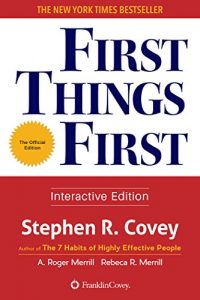
In this book, the author, Stephen Covey digs deep into the popular concept of personal time management. He points out the problems with the 3 generations of this concept and proposes a 4th generation of this concept which is based on values and principles and argues why this eliminates the problems faced by previous concepts.
Time Management: Clock & Compass-
The Clock- The clock includes all our commitments, schedules, activities, goals, appointments.
The Compass- The compass embodies our visions, principles, values, purpose.
3 Generations of Time Management:
First-generation: These consist of all our to-do lists and reminders. First things are based on what things you see in front of you.
Second-generation: These include calendars, meetings, appointments, schedules and prep for future events.
Third-generation: This refers to establishing long term goals and prioritizing your activities on a daily basis.
The 4th generation:
- The author proposes a 4th generation which is based on values and principles and argues why this eliminates the problems faced by previous concepts.
- The 3 generations have a weakness of relying upon urgency and lack of understanding quality of life.
- Implementing the 4th generation is not easy and requires a massive shift in thinking.
- Comprehending what is important to you instead of being responsive to urgency is the key to understanding this concept.
Time Management Matrix –
Quadrant 1—Urgent and important:
A situation of emergency. It can result in a worse situation if left unattended.
Quadrant 2—Important, not urgent:
This quadrant includes personal development goals, skill development, high-level planning.
Quadrant 3—Urgent but not important:
These create of sense of being important such as phone calls, meetings and appointments.
Quadrant 4—Not urgent or important:
Recreational things. They don’t have anything to do with urgency or importance.
According to the author, we can be happier in life by setting our priorities right and that we all should strive to add more meaning to our lives.
FOUR AREAS OF HUMAN NEEDS :
This helps to focus on setting the right priority and focus ourselves:
- Physical requirements, like clothes and food.
- Social requirements, like love and maintaining relationships.
- Mental requirements, to learn, explore and grow.
- Spiritual requirements, to evolve, to find peace and tranquillity.
When all needs come together it is called “the fire within”. Focusing on one area can eliminate the problems faced in other areas.
Put Important Things First
- People have a tendency to do urgent things first as they give a sense of importance. Covey argues that this is dangerous because there will never come a time to work on something important as long as it is urgent.
- Importance should be based on principles and values that you hold.
- Make a personal mission statement.
- Ask yourself what is personally important to you. Will the decision you make align with those personal goals and values.
- Listen to others. Learn to assess their situations.
- Most importantly be honest with yourself.
# Key Takeaways:
– The key to effective time management is prioritization and focusing on what is truly important.
– The Time Management Matrix helps individuals categorize tasks based on urgency and importance.
– The four quadrants of the Time Management Matrix are: Quadrant 1 (Urgent and Important), Quadrant 2 (Not Urgent but Important), Quadrant 3 (Urgent but Not Important), and Quadrant 4 (Not Urgent and Not Important).
– Quadrant 2 tasks should be given the most attention as they are important but not urgent, and can prevent tasks from falling into Quadrant 1.
– The concept of “big rocks” emphasizes the importance of prioritizing important tasks and scheduling them first.
– The four human needs of survival, security, love and belonging, and self-esteem and self-actualization should be balanced in order to achieve true fulfillment.
# Practical Application:
– The Time Management Matrix can be used to prioritize tasks and allocate time accordingly.
– By identifying and focusing on Quadrant 2 tasks, individuals can prevent tasks from becoming urgent and falling into Quadrant 1.
– The concept of “big rocks” can be applied by scheduling important tasks first and then filling in the remaining time with less important tasks.
– Balancing the four human needs can help individuals achieve a sense of fulfillment and balance in their personal and professional lives.
# Valuable Insights for Leaders and Managers:
– Chapter 3: “The Urgency Addiction” highlights the importance of avoiding the trap of constantly reacting to urgent tasks and neglecting important tasks.
– Chapter 4: “The Big Rocks” emphasizes the importance of prioritizing and scheduling important tasks first.
– Chapter 5: “The Quadrant of Extraordinary Results” provides strategies for effectively managing Quadrant 2 tasks and achieving true fulfillment.
# Case Studies and Examples:
– The story of the “Golden Buddha” in Chapter 1 illustrates the concept of “big rocks” and the importance of prioritizing.
– The example of a CEO in Chapter 3 showcases the negative effects of constantly reacting to urgent tasks and neglecting important tasks.
– The story of a father and son in Chapter 5 demonstrates the importance of balancing the four human needs for true fulfillment.
Leave a Reply